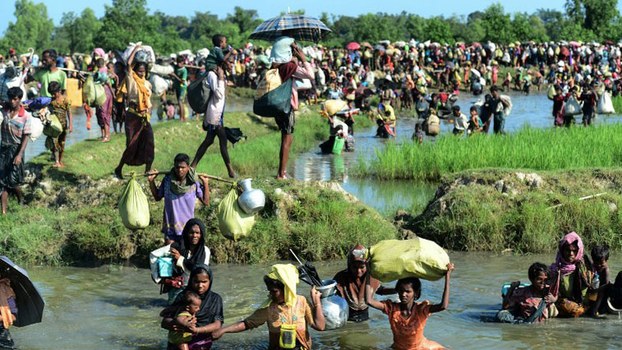




The European Union on Monday called on Myanmar to bring to justice the perpetrators of crimes against the country's Rohingya minority and said it was reviewing military cooperation with Naypyidaw.
"Credible allegations of serious human rights violations and abuses, including brutal attacks on children, must be thoroughly investigated," EU foreign ministers said in a statement on the crisis, which has seen more than 500,000 Rohingya flee to Bangladesh since Aug. 25, with many reporting indiscriminate killings, rape, looting and burning of villages.
"There are deeply worrying reports of continuing arson and violence against people and serious human rights violations, including indiscriminate firing of weapons, the presence of landmines and sexual and gender based violence. This is not acceptable and must end immediately," it said.
"When so many people are displaced so quickly this strongly indicates a deliberate action to expel a minority. Therefore it is of utmost importance that refugees can return in safety and dignity," said the EU statement.
The EU ministers said they are suspending invitations to Europe of Myanmar military leaders and will "review all practical defense cooperation."
Bangladesh and humanitarian agencies have been struggling to accommodate and provide basic services for the hundreds of thousands of Rohingya who left northern Rakhine during a military crackdown following deadly Aug. 25 attacks on 30 police posts and an army facility.
The Arakan Rohingya Salvation Army (ARSA), a militant Muslim group, claimed responsibility for the attacks as well as for deadly smaller-scale raids on three border guard stations in October 2016.
More than 530,000 Rohingya civilians have fled their homes crossing into Bangladesh, where some 400,000 Rohingya refugees had already been living in refugee camps since they began arriving in 2012.
Myanmar’s security forces and paramilitaries burned at least 288 Rohingya villages to the ground. The military has killed an estimated 3,000 people in what it terms counter-terrorist operations, but that intentionally targeted civilians in what the United Nations High Commission for Refugees has termed “a textbook case of ethnic cleansing.”
The EU ministers urged the Myanmar government to "take all measures to defuse tensions between communities" and grant unconditional humanitarian access to Rakhine state for the UN, Red Cross and other international NGOs.
The ministers also called on Myanmar to "cooperate fully with the Human Rights Council's independent international Fact-Finding Mission and to allow it full, safe and unhindered access to the country without delay."
Myanmar has refused to give the UN rights investigators visas to visit the country, and has shrugged off criticism from foreign countries, including the United States and lawmakers from the Association of Southeast Asian Nations (ASEAN), to which the country belongs.
There was no direct response from Myanmar to the EU statement, but Lt. Gen. Sein Win, the country's defense minister, said "We have nothing to say on the consideration of western countries’ sanctions against Myanmar generals."
"We believe in Karma as we are Buddhists. We will have good results if we do good things and will have bad results if we do badly. Our mind is clear. As we are doing the right thing to protect our country, we don’t worry about whatever others say," he said in a statement.
Earlier on Monday, the Associated Press reported that an overcrowded boat carrying Rohingya fleeing Myanmar capsized in the Bay of Bengal near a Bangladeshi fishing village, killing 12 people, including six children.
AP quoted local officials as saying they were told by survivors that as many as 65 people were on board, of which almost half were children. Five bodies were recovered and at least 21 people survived, the report said.
Translated by Khet Mar. Written in English by Paul Eckert.